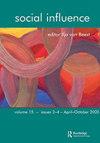The lonely bystander: ostracism leads to less helping in virtual bystander situations
IF 0.6
3区 心理学
Q3 PSYCHOLOGY, SOCIAL
引用次数: 9
Abstract
Abstract People are less likely to help when they have been ostracized, or when they are in the presence of bystanders. In the current manuscript we test both these influences simultaneously. We postulated two opposing hypotheses: first, helping decreases after ostracism, even when intervention is already less likely due to bystander presence. Second, the bystander effect could be reversed, as helping may benefit one’s reputation, especially in the presence of others. After playing Cyberball to manipulate ostracism, participants could help others on either a crowded or empty internet forum. In support of the first hypothesis, we found two main effects: replicating the bystander effect, the presence of others diminished helping. Moreover, ostracism diminished helping, even in the presence of others.孤独的旁观者:在虚拟的旁观者情境中,被排斥导致帮助减少
当人们被排斥或有旁观者在场时,他们不太可能提供帮助。在当前的手稿中,我们同时测试了这两种影响。我们假设了两个相反的假设:第一,在被排斥后,帮助会减少,即使由于旁观者的存在,干预的可能性已经降低。其次,旁观者效应可以被逆转,因为帮助他人可能有利于自己的声誉,尤其是在他人在场的情况下。通过玩赛博球来操纵排斥之后,参与者可以在拥挤或空旷的互联网论坛上帮助他人。为了支持第一个假设,我们发现了两个主要影响:复制旁观者效应,其他人的存在减少了帮助。此外,排斥减少了帮助,即使有其他人在场。
本文章由计算机程序翻译,如有差异,请以英文原文为准。
求助全文
约1分钟内获得全文
求助全文
来源期刊

Social Influence
PSYCHOLOGY, SOCIAL-
CiteScore
1.50
自引率
0.00%
发文量
4
期刊介绍:
Social Influence is a journal that provides an integrated focus for research into this important, dynamic, and multi-disciplinary field. Topics covered include: conformity, norms, social influence tactics such as norm of reciprocity, authority, scarcity, interpersonal influence, persuasion, power, advertising, mass media effects, political persuasion, propaganda, comparative influence, compliance, minority influence, influence in groups, cultic influence, social movements, social contagions, rumors, resistance to influence, influence across cultures, and the history of influence research.
 求助内容:
求助内容: 应助结果提醒方式:
应助结果提醒方式:


